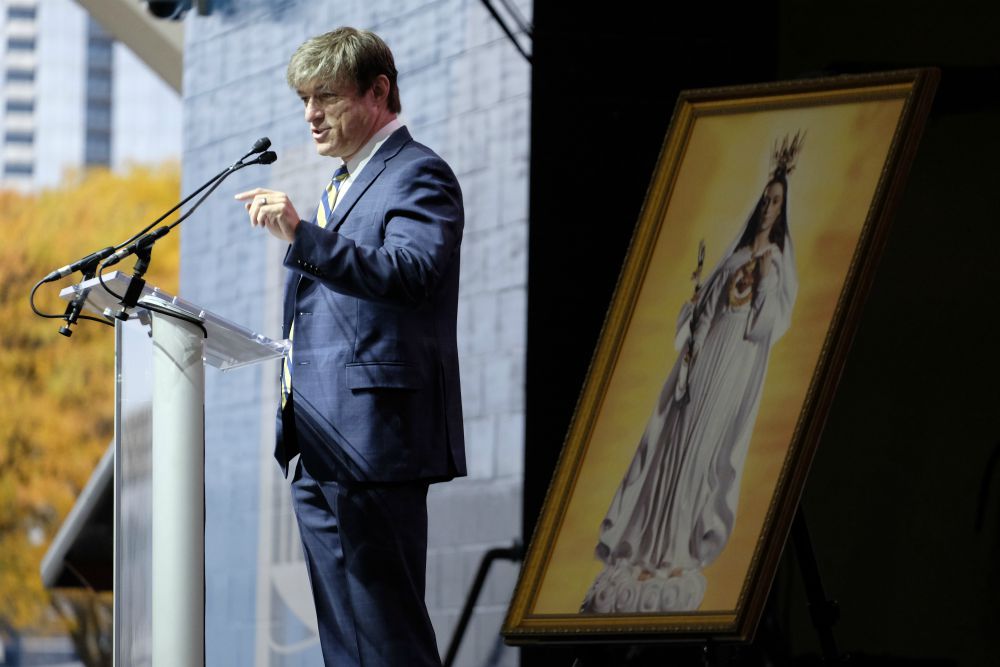
Gary Michael Voris of Church Militant addresses a rally Nov. 13, 2018, sponsored by Church Militant in Baltimore. (CNS/Tennessee Register/Rick Musacchio)
One of the U.S. Catholic Church's most infamous agitators, known for aggressive smear campaigns against church leaders and organizations, may soon face a reckoning in court as a result of a rare lawsuit against his operations.
Gary Michael Voris, the founder of the fringe right-wing group Church Militant, is being sued by a New Hampshire priest for defamation. A U.S. District Court judge rejected Voris' attempt last month to have the lawsuit dismissed.
In February, Fr. Georges de Laire, judicial vicar and the vicar for canonical affairs for the Diocese of Manchester, brought suit against both Voris and his media enterprise following a series of videos and articles against de Laire dating back to January 2019.
According to the original complaint, Voris and Church Militant in "knowing and reckless disregard of the truth embarked on a campaign of defamation against Father de Laire, intended to besmirch Father de Laire's reputation and destroy his standing in the community of his congregation in New Hampshire, and in the Catholic Church at large, in the United States and in Rome."
One of the priest's attorneys, Suzanne Elovecky, told NCR the decision to bring suit was not an easy one, but one ultimately made "for the sake of accountability and truth telling, which Fr. de Laire viewed as important for him and the community at large."
Newspapers and websites that have lost defamation lawsuits have suffered setbacks, said Nicholas Cafardi, a civil and canon lawyer and a professor and former dean at Duquesne University School of Law.
"Typically, there is no insurance for defamation," said Cafardi.
As of 2018, Church Militant operated on an annual budget of about $2.8 million per year.
Advertisement
Voris' targeting of de Laire centers around his handling of a canonical matter that involved a traditionalist organization in his diocese known as the Slaves of the Immaculate Heart of Mary* of St. Benedict Center.
The group was formed after its founder, former Jesuit priest Leonard Feeney, was excommunicated by the Vatican in 1953 for his belief that only those baptized in the Catholic Church could receive salvation. The group as it operates today has since been labeled a hate group by the Southern Poverty Law Center for preaching "anti-Semitic hatred."
The diocese had forbidden the community of the St. Benedict Center in Richmond, New Hampshire, to present themselves as an official Catholic institution, while at the same time allowing a priest to provide ministry to the group. According to the Diocese of Manchester's website, the group "manipulated" this "to imply support or recognition by the Church."
Church Militant has also been banned from presenting itself as a Catholic entity. Under its previous iteration, the organization, which operates in the Detroit suburbs, used to be known as Real Catholic TV. In December 2011, the Detroit Archdiocese said "it does not regard them as being authorized to use the word 'Catholic' to identify or promote their public activities."
Holly Fournier, a spokeswoman for the Detroit Archdiocese, told NCR that the 2011 ban remains in effect.
"Church Militant is not affiliated with, endorsed, or recommended by the Archdiocese of Detroit; it is not recognized as a Church apostolate," she wrote in a statement.
It fell to de Laire as judicial vicar to reinforce a Vatican decree that the Slaves of the Immaculate Heart of Mary could not present themselves as Catholic. According to the lawsuit, this resulted in "several articles [at Church Militant] not only criticizing the Diocese's decision to issue the Decree, but defaming Father de Laire, personally."
Voris, who, according to the lawsuit, was an ally of the organization, charged that de Laire was "emotionally unstable" and seeking promotion as a Catholic bishop or a Vatican appointment, allegations the lawsuit rejects. In December 2019, de Laire wrote to Voris threatening legal action, and in a January 2020 letter, Church Militant stood by their original claims against the priest.
Voris sought to have the lawsuit dismissed over jurisdiction issues because Church Militant did not have "sufficient contacts with New Hampshire." A judge rejected that defense, noting the priest "felt the effects of the alleged defamation in New Hampshire."

(Unsplash/Bill Oxford)
Attorneys for de Laire told NCR the lawsuit now enters into the discovery phase of litigation and that it would likely take "a year or longer" for the case to go to trial.
While Voris and Church Militant's tactics have long been under scrutiny — he has referred to the Cardinal Wilton Gregory of Washington, D.C., as an "African Queen," called for Pope Francis' resignation, been criticized for fueling hatred against Muslims and Jews, and long targeted a number of priests or bishops he believes to be progressive — Voris has avoided legal retaliation.
Until now.
Priests have, historically, "turned the other cheek," said Cafardi, noting that there's nothing in canon law that would prevent such a suit.
When it comes to whether or not to fight back against personal attacks, Cafardi said one must weigh the pros and cons.
"By filing the lawsuit, you perpetuate the public's discussion of the original charge, and that's certainly a con," he noted. "The pro might be that once you've established that they've published defamatory material, that certainly damages their operation going forward."
Msgr. Stephen Rossetti, research associate professor at Catholic University of America, told NCR that "in previous times, Church conflicts were largely resolved quietly."
"In this era of transparency and more open conflicts, there are more Church conflicts aired in the media and on the internet," he wrote via email. "The internet especially has given rise to more open conflicts in a variety of venues, including the Church."
Rossetti, who is a trained psychologist and an expert in priestly formation, said that a survey of a range of internet sources demonstrates that the laity feels "more empowered and able to be critical of Church leaders."
"All this gives rise to the need for some sort of fair arbitration of conflicts," he continued. "In this case, the civil courts will handle it. I don't see this necessarily as a bad thing: the civil court can hopefully be a rational, unbiased adjudicator of the conflict and render justice to all parties."
Cafardi said it will be interesting to see how the case against Church Militant proceeds.
He pointed to the decade-long legal battle involving the website Gawker dating back to 2007, in which the company was sued for publishing a sex tape of pro-wrestler Hulk Hogan. After Hogan was awarded $140 million in damages, the website was forced to declare bankruptcy.
"The whole purpose was to put the website out of business, and they did," Cafardi observed. "A large defamation lawsuit can put websites out of business."
* This link has been updated.







